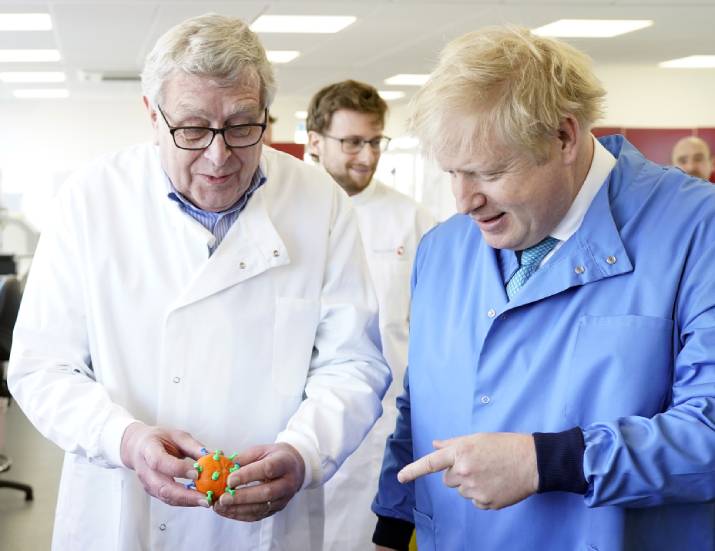| Opinion |
| Lauding China's Resolution | |
| Outbreak in UK makes people realize the necessity for drastic steps | |
|
|
 British Prime Minister Boris Johnson (right) visits a laboratory doing research on coronavirus diagnosis in Bedfordshire on March 6(XINHUA)
Anti-Chinese incidents have been reported in many countries across the world, including Britain. Many people perceived as Chinese-looking are not Chinese but were born in Britain; or, they have not been to any infected regions recently, if ever. Of course, unpleasant and threatening behavior can be distressing for the recipient. In cyberspace, where traditional British politeness has taken a hammering, the abuse tends to be more vicious, crude and overtly racist. Actually, the majority of people in Britain do not have a negative view of China and the Chinese people. They admire the resolute way in which Chinese authorities have sought to isolate, identify and treat victims and carriers of the coronavirus, despite efforts by the British press and social media to highlight perceived deficiencies and mistakes. They have seen films of the magnificent drive to build, in a matter of days, two hospitals with 2,600 beds in Wuhan, capital of the hardest-hit Hubei Province in central China, to isolate, test and treat victims of the virus. In Britain, major projects of this kind would take years rather than days or weeks to accomplish. People watched with amazement as the Chinese authorities mobilized the necessary resources for the job. Large sections of the British media have also reported the praise of China's magnificent control efforts from such well-regarded authorities as the UN secretary general and the World Health Organization. Now that the British Government has published its own plans to combat the novel coronavirus outbreak, the public understands that drastic steps may be necessary along the lines of those already taken initially in China and now in the Republic of Korea, Italy and elsewhere. Certainly, more could be done in Britain in terms of control and prevention. For example, no comprehensive, only selective strategy appears to be in place for compulsory questioning and where necessary, testing and isolation of travelers returning to Britain from infected regions abroad. More generally, too much reliance is being placed on people's voluntary self-isolation. Masks and anti-septic hand-gel are not widely available in shops, not even in the few retail outlets that would normally sell them. Concerns about the spread of the virus in Britain are now very real. People expect healthcare and medicines to be freely and quickly available so that the epidemic is brought swiftly under control. Public alarm could grow rapidly if this fails to happen. At the same time, people in Britain—where isolation and testing have contained the virus so far—and around the world would take some comfort from the swift development of vaccines to combat the virus. Much of this essential research and development is already taking place in China, where public wellbeing and state decree decide the immediate priorities for the pharmaceutical industry, rather than market forces and the short-term drive for maximum profit. As the novel coronavirus spreads around the world while appearing to have stalled in China, people should stop the prejudice and discrimination, and cooperate to beat the virus as soon as possible. The author is a former senior lecturer in political economy and history at the University of Wales and currently General Secretary of the Communist Party of Britain This article was first published on China.org.cn
Comments to yanwei@bjreview.com |
|
||||||||||||||||||||||||||||||
|
